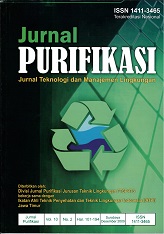BEBAN PENCEMARAN LIMBAH CAIR INDUSTRI TAHU DAN ANALISIS ALTERNATIF STRATEGI PENGELOLAANNYA
Main Article Content
Abstract
This research work is aimed to evaluate the process performance profile of tofu industry and its associated pollution load as well as analysing its management strategy. The work was carried out through industrial survey and measurement in various technological states of tofu processing in the regions of Tegal, Klaten, Solo, Jakarta, and Bogor. An experimental work was also conducted to optimise the level of process water usage in tofu processing. The research work showed that every 1 kg soybean processed results in 3.3±0.7 kg tofu curd, 2.0-2.2 kg pressed cake, and 17±3 L effluent in average. This wastewater exhibits the main source of environmental pollution, having the characteristics of BOD5, total COD, soluble COD, TSS, and TKN of 50±8, 110±20, 80±20, 9±3, and 4±2 g/kg soybean processed, respectively. The experimental work indicated that varying the amount of process water in the range of 16-25 L/kg soybean did not result in a significant improvement of the product yield as well as pressed cake. Based on the measurement results, the laboratory analysis, and theoretical information, this paper demonstrates quantitatively some potential benefits derived from utilising the organic content of tofu processing effluent by treating it anaerobically to generate biogas.
Downloads
Article Details
Submission of a manuscript to Jurnal Purifikasi means that the work has never been published in another journal and is not under consideration for publication elsewhere. The author hereby agrees to submit the copyright of the manuscript and its contents to Jurnal Purifikasi, if accepted for publication. Accepted manuscripts will be published in printed form where the ISSN is bound in printed form, not in online form (pdf). Authors are not allowed to publish their work in other forms (journals) without permission from the Jurnal Purifikasi manager.
By submitting a manuscript, the author is deemed to know all the rights and obligations attached to each manuscript.








